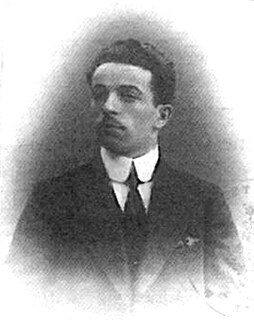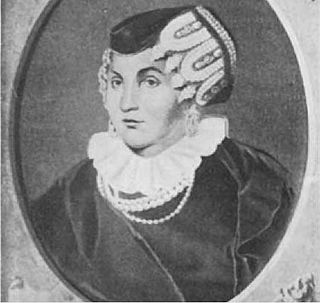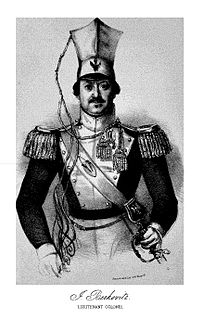| Look up berek in Wiktionary, the free dictionary. |
Berek may refer to:
| Look up berek in Wiktionary, the free dictionary. |
Berek may refer to:
In Polish, Berek is a diminutive of the names Baruch or Ber, and later a name in its own right.
Baruch is a masculine name among Jews used from Biblical times to the present, which is sometimes used as surname. It is also found, though more rarely, among Christians—particularly among Protestants who use Old Testament names.

The Warsaw Ghetto Uprising was the 1943 act of Jewish resistance in the Warsaw Ghetto in German-occupied Poland during World War II to oppose Nazi Germany's final effort to transport the remaining ghetto population to Majdanek and Treblinka death camps.

Berek Joselewicz was a Polish Jewish colonel of the Polish Army during the Kościuszko Uprising. Joselewicz commanded the first Jewish military formation in modern history excluding Prince Potemkin's Israelovsky. He was also a merchant and financial agent of the Polish magnate Prince Massalski.
The Jewish Legion (1917–1919) was the battalions of the Royal Fusiliers of the British Army that fought in World War I.

Kretinga is a town in Klaipėda County, Lithuania. It is the capital of the Kretinga district municipality. It is located 12 km (7.5 mi) east of the popular Baltic Sea resort town of Palanga, and about 25 km (16 mi) north of Lithuania's 3rd largest city and principal seaport, Klaipėda.
Władysław is a Polish given male name, cognate with Vladislav. Feminine form is Władysława. Alternate, archaic forms are Włodzisław (male) and Włodzisława (female).

Kock is a town in eastern Poland, about 45 kilometres north of Lublin and 120 kilometres south-east of Warsaw. It lies in Lublin Voivodeship, in Lubartów County. It is the capital of the administrative district Gmina Kock. Historically Kock belongs to the Polish province of Lesser Poland and is located in its northeastern corner. As of 2004, its population numbered 3,509.

Lubartów Ghetto was established by Nazi Germany in occupied Poland during World War II, and existed officially from 1941 until October 1942. The Polish Jews of the town of Lubartów were confined there initially. The ghetto inmates also included Jews deported from other cities in the vicinity including Lublin and Ciechanów and the rest of German-occupied Europe for the total of 3,500 Jews in its initial stages including 2,000 Jews from Slovakia. In May 1942 additional transport from Slovakia with 2,421 Jews arrived.
DOV or Dov could refer to:

Mieczysław Norwid-Neugebauer was a minister in the interwar Polish government, and a lieutenant general in the Polish Army.
Mieczysław or Mečislovas (Lithuanian) is a Slavic name of Polish origin and consists of two parts: miecz "sword", and sław "glory, famous". Feminine form: Mieczysława. Alternate form: Mieszko.

Dov Freiberg born Berek Freiberg, was a Holocaust survivor, writer, and witness at the Eichmann trial and the Demjanjuk case. Freiberg was a prisoner at Sobibor extermination camp where he participated in the Sobibor prisoners' revolt. After the revolt, he managed to escape into nearby woods and survived until the Soviet Army liberated the region in July 1944.

Dr. Julian Chorążycki served as doctor-in-chief of the infantry regiment in the Polish Army during the reconstitution of sovereign Poland. In the interwar period, he was a throat surgeon practising in Warsaw. Born Jewish, Chorążycki spent two years in the Warsaw Ghetto. During the Holocaust in Poland he became the first leader of the perilous prisoner uprising at the Treblinka extermination camp. On August 2, 1943 – after the long period of preparation posing an immediate threat to life – an armed revolt in Treblinka erupted, however, Chorążycki committed suicide on April 19, 1943 when faced with imminent capture, to avoid revealing details of the uprising and its participants under torture.

Berek Lajcher was a Jewish physician and social activist from Wyszków before the Holocaust in Poland, remembered for his leadership in the prisoner uprising at Treblinka extermination camp. More than 800,000 Jews, as well as unknown numbers of Romani people, were murdered at Treblinka in the course of Operation Reinhard in World War II.
Szwarc is a Polonized-Yiddish version of the German surname Schwartz.
Jan Berek was a soldier of the Austro-Hungarian Army and Generał brygady of the Polish Army, who fought in World War I, Polish–Soviet War and the Invasion of Poland.

Temerl Bergson was a Polish Jewish businesswoman. She was a supporter of Jews living in Warsaw and patroness of the Hasidic movement in Poland. She was renowned for her largesse in her philanthropy toward Polish Hasidic leaders and tzadikim, and was said to have "distributed money like ashes". Referred to as the "Doña Gracia of Hasidism", she is credited with the success of the Hasidic movement in Poland in the early 19th century.

Józef Berkowicz also known as Joseph Berkovitz or Berkowitz was a Polish military officer of Jewish origin, the only son of Berek Joselewicz.
Karol is a Basque, Danish, Finnish, Norwegian, Polish, Slovak, Slovene, and Swedish masculine given name that is a form of Karl or Karolus. Notable people with the name include the following: